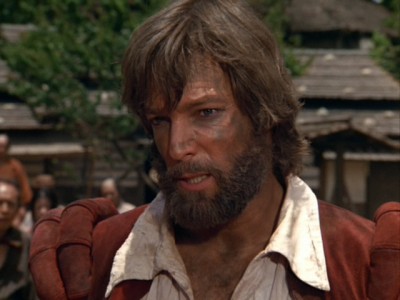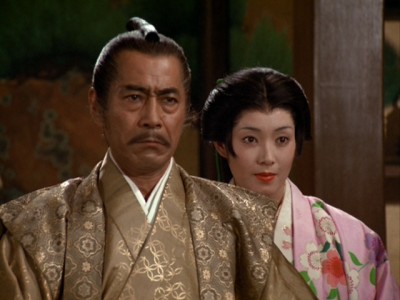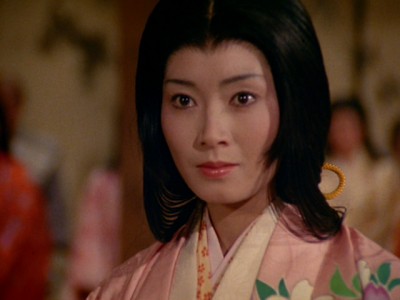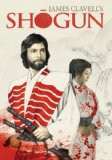| Reviews & Columns |
|
Reviews DVD TV on DVD Blu-ray 4K UHD International DVDs In Theaters Reviews by Studio Video Games Features Collector Series DVDs Easter Egg Database Interviews DVD Talk Radio Feature Articles Columns Anime Talk DVD Savant Horror DVDs The M.O.D. Squad Art House HD Talk Silent DVD
|
DVD Talk Forum |
|
|
| Resources |
|
DVD Price Search Customer Service #'s RCE Info Links |
|
Columns
|
|
|
James Clavell's Shogun
The phrase "they just don't make 'em like they used to" gets thrown around a lot, but the 1980, nine-hour epic miniseries "Shogun" is definitely a fitting candidate. Adapted from James Clavell's equally, if not more epic novel of the same name, the series was tasked with balancing adventure, drama, and romance, all amidst the backdrop of 17th century feudal Japan. Directed by Jerry London, "Shogun" keeps viewers riveted by strictly playing the story from the point of view of Blackthorne, the Dutch pirate protagonist played by Richard Chamberlain. While most viewers will associate Chamberlain with his role in the 60s on "Dr. Kildare" or in the melodramatic, dated miniseries "The Thorn Birds," which aired a few years after "Shogun," his work here is incredibly strong, especially when tasked with carrying a great portion of the narrative weight upon his shoulders.
"Shogun" begins with a strong feeling of high adventure, almost a throwback to the live action Disney adventures of the 50s and 60s. Very quickly, the series throws viewers its first curveball, stranding Blackthorne and the crew of the Erasmus on the island of Japan. Recalling Boorman's "Hell in the Pacific," "Shogun" makes Blackthorne the stand-in for the viewer, refusing to let viewers in on any dialogue from the Japanese Blackthorne encounters, save for what is translated by a slyly sinister Jesuit priest. Blackthorne slowly but surely learns the Japanese aren't the unreasonable maniacs he may have perceived them to be, a notion London lets viewers in on, through the wordless reaction of Lord Yabu's struggle to maintain a stone face as the screams of a sailor sentenced to death out of obligation to the law, looms in the background.

For the miniseries to keep viewers engaged, Blackthorne, rechristened Anjin-san (or Pilot, reflective of his duty on the Erasmus) is given a translator, in the form of the lovely Mariko (Yoko Shimada). As one might expect, over the course of the miniseries, the two develop feelings for each other, but their love affair is forbidden, given Blackthorne's status as an outside and Mariko's marriage to the samurai Buntaro. Shimada's performance is a true highlight of Shogun, combining demure feminine qualities with an often-sheltered fierceness. Further complicating matters is Blackthorne's usefulness to Lord Toranaga and his bid for Shogun, leader of the Japanese army. Toranaga is an always-looming force throughout the course of the miniseries, which is attributed both to the character's importance to the story at large and the actor filling the shoes of the character, Toshiro Mifune. Mifune brings to the table exactly what anyone would expect the legendary actor to, especially in 1980, when his status as an icon (at least in Japan) was firmly cemented.
Ultimately, "Shogun" becomes the story of Blackthorne's quest to return to his ship and leave Japan. The romance with Mariko and Toranaga's political intrigue are all merely bumps along the way; fortunately Blackthorne isn't alone and finds allies at points in Rodrigues, a Portuguese sailor played with great zeal by John Rhys-Davies, as well as others, Japanese and non-Japanese. "Shogun" rewards viewers who invest their time with a well paced, intriguing story that displays tremendous respect for the Japanese culture, often serving as a basic primer on customs and attitudes. It takes little effort to find oneself sucked into this wonderful world that is both familiar and strange. Having viewed Shogun nearly a decade ago, I wondered if it would hold up on repeat viewings, and it does, almost perfectly.

Aside from "Roots" I can't think of an epic length miniseries that has the replay value and quality of "Shogun." The biggest criticism to befall the series regards the ending, which has been labeled rushed and disappointing. I wholeheartedly disagree; the climax of "Shogun" is realistically in line with the journey viewers take with Blackthorne and its easy to confuse the dramatic plot turns with hasty storytelling, especially given the steady, unrushed pace of the series. The only nitpicks fall on Chamberlain's sometimes overly relaxed performance. His screen presence is strong (even when paired off with Mifune), but in the early "fish out of water" scenes, there are a few moments where his calm borders the unbelievable. Ultimately, the consistency and quality of the production renders any minor quibbles irrelevant. "Shogun" remains one of, if not THE standard for a crowd-pleasing miniseries, the likes of which network television no longer makes.
Lastly, I feel a strong obligation to address this particular release, which is branded as a special "30th Anniversary Edition." The miniseries was originally released in 2003 by Paramount and this release is exactly the same, save for the new, slim packaging. The discs are the same discs that came in the original set, down to the old copyright dates and now long dated teaser trailer for the first release of the "Indiana Jones" films on DVDs. As a huge fan of the miniseries, I had hoped something new would find its way into this release, most notably the 125-minute theatrical version, which is likely a disaster from a storytelling point, but would be a curious piece of history. Alas, this release is really only for those who have not yet bought this fantastic series or really want to cut down on shelf space.

THE DVD
The Video
The 1.33:1 original aspect ratio transfers are incredibly strong for a 1980s network television miniseries. Colors can occasionally translate as overly warm, particularly the robes of the priests and some skin tones, however detail is strong given the source material and the quality of the image is incredibly clean, with no artificial digital tinkering.
The Audio
The Dolby Digital English 5.1 audio track only pays off during action sequences and when the rousing Maurice Jarre composed score picks up. Dialogue is clear and everything is distortion free. The original English mono track is included and has been restored to great effect; it pales in comparison to the enhanced 5.1 track but for purists it's a satisfying inclusion. English subtitles are included.
The Extras
The fifth and final disc in the set houses a number of informative extras. First up is the nearly 90-minute documentary "The Making of Shogun" which covers every aspect of production and gathers almost all the (living) principal players for interviews. Three short historical featurettes provide insight into "The Samurai," "The Tea Ceremony," and "The Geisha." Last but not least are a series of selected scenes with a commentary by director Jerry London. London's comments are engaging and informative and it's a shame there weren't more selections, as a commentary on the entire nine-hour production is understandably unfeasible.
Final Thoughts
While this repackaging is questionable, "Shogun" remains a benchmark in epic storytelling: big or little screen. It's an immersive blend of genres that could have easily stumbled or outright failed if it weren't for the skilled hands of those guiding the ship both behind and in front of the camera. As an original release (or had their been new supplements of substance), I'd give this DVD Talk's highest rating of Collector Edition; as a straight repackaging, I'll merely say Highly Recommended.
|
| Popular Reviews |
| Sponsored Links |
|
|
| Sponsored Links |
|
|
| Release List | Reviews | Shop | Newsletter | Forum | DVD Giveaways | Blu-Ray | Advertise |
|
Copyright 2024 DVDTalk.com All Rights Reserved. Legal Info, Privacy Policy, Terms of Use,
Manage Preferences,
Your Privacy Choices | |||||||












